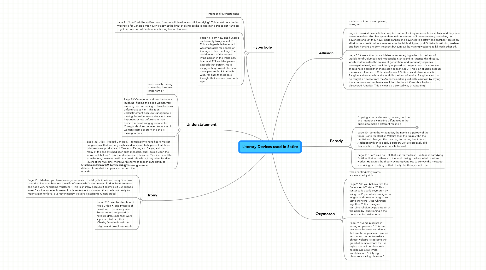Literary Devices used in Satire
by Marie Kim


1. Hyperbole
1.1. Intentional overstatement
1.2. page 11 "Alas!" said he to Pangloss, "get me a little wine and oil; I am dying" This would be a perfect hyperbole for Candide was never exactly at the brink of dying but he is just saying this to get Pangloss to get him win and oil. Voltaire is satirizing human laziness.
1.3. page 43 "I am now one hundred and seventy-two years old" This is a hyperbole because it was impossible for people of that age to live that long. The world record of the longest living person in the world now is around 122 and this person exceeds that person. He is exaggerating how old he is to make people think that he is wise, for back then people thought that wisdom came with age.
2. Irony
2.1. Situation or events that convey a reality different from what it appears to be from the outside
2.2. Page 51 "'Madam, you have seventy-two years of nobility, but not one penny. You now have the chance to become the wife of a man who's the greatest lord in South America and has a very handsome mustache." This is an irony because it seems as if Cunegonde loves Candide for love, however in this sentence it is showing that she is not ready to marry a man for love, but rather money. Voltaire is satirizing human greed.
2.3. page 24 "I am the daughter of Pope Urdan X, and Princess of Palestrina" This is irony since Popes are not supposed to have children since they were supposed to keep their Chasity. Voltaire is satirizing religion and how it is corrupt.
3. Understatement
3.1. intentionally making something look less important or
3.2. Page 23"Cunegounde almost broke out laughing, finding the good woman very amusing, for pretending to have been as unfortunate as him" This is an understatement because Cunegoude is making the old woman's story look less important or less unfortunate than her's. This is satirizing ignorance, for Cunegoude does not even know the old woman's name or story and she is making fun of it.
3.3. page 38 “Alas!” replied Candide, “I remember to have heard Master Pangloss say, that formerly such accidents used to happen; that these mixtures were productive of Centaurs, Fauns, and Satyrs; and that many of the ancients had seen such monsters, but I looked upon the whole as fabulous.” This is understatement because Candide heard this story before, however he did not heed this advice/story when he killed lovers of the two girls, moreover his form of speech puts down or lowers this story. This is satirizing human ignorance.
4. Allusion
4.1. a reference to an event, person, book, etc
4.2. page 9"mankind have a little corrupted nature, for they were not born wolves, and they have become wolves; God has given them neither cannon of four-and-twenty pounders, nor bayonets; and yet they have made cannon and bayonets to destroy one another." This is an allusion because it makes a reference to the biblical figure, god. Voltaire is satirizing warfare and how humans are born innocent but turn evil by making weapons to kill each other off.
4.3. page 8 "it was a thing unavoidable, a necessary ingredient in the best of worlds; for if Columbus had not caught in an island in America this disease, which contaminates the source of generation, and frequently impedes propagation itself, and is evidently opposed to the great end of nature, we should have had neither chocolate nor cochineal." This is an allusion because it makes a reference to Columbus(person). Voltaire used allusion to satire Pangloss's theory on how the world is the best of worlds. Pangloss said that he caught a disease from the Americas and he justified his disease by saying that chocolate and cochineal would not be here if Columbus had not discovered America. This is clearly a distorted way of reasoning.
5. Oxymoron
5.1. when contradictory words appear side by side
5.2. Page 9 "do you believe that the Pope is Anti-Christian?" This sentence is clearly oxymoron by using the Pope, which is a figure of religion and devotion to god and using the word "Anti-Christian" together. Voltaire is again satirizing religion by poking fun at the pope by questioning if the pope is anti-christian or not.
5.3. Page 74 "Some pleasure in having no pleasure." This is an oxymoron because two things that are the opposite are placed next to each other to make a phrase. Voltaire is satirizing the greed of human nature for it is saying that a little pleasure is no pleasure at all which translates into "Only big pleasure is having pleasure."
6. Parody
6.1. Copying a particular event, person, book, etc and intentionally making differences in the original to make a different meaning
6.1.1. John the Anabaptist
